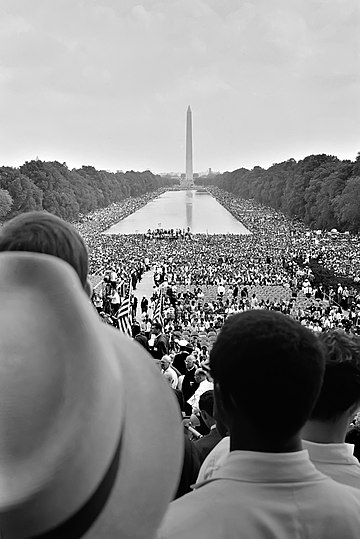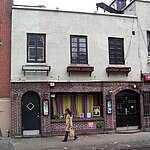Portal:1960s
The 1960s Portal
The 1960s became synonymous with the new, radical, and subversive events and trends of the period. In Africa the 1960s was a period of radical political change as 32 countries gained independence from their European colonial rulers. Some commentators have seen in this era a classical Jungian nightmare cycle, where a rigid culture, unable to contain the demands for greater individual freedom, broke free of the social constraints of the previous age through extreme deviation from the norm. Christopher Booker charts the rise, success, fall/nightmare and explosion in the London scene of the 1960s. However, this alone does not explain the mass nature of the phenomenon. Several nations such as the U.S., France, Germany and Britain turned to the left in the early and mid 1960s. In the United States, John F. Kennedy, a Keynesian and staunch anti-communist, pushed for social reforms. His assassination in 1963 was a stunning shock. Liberal reforms were finally passed under Lyndon B. Johnson including civil rights for African Americans and healthcare for the elderly and the poor. Despite his large-scale Great Society programs, Johnson was increasingly reviled by the New Left at home and abroad. The heavy-handed American role in the Vietnam War outraged student protestors across the globe, as they found peasant rebellion typified by Ho Chi Minh and Che Guevara more appealing. Italy formed its first left-of-center government in March 1962 with a coalition of Christian Democrats, Social Democrats, and moderate Republicans. Socialists joined the ruling block in December 1963. In Britain, the Labour Party gained power in 1964. In Brazil, João Goulart became president after Jânio Quadros resigned. This is a Featured article, which represents some of the best content on English Wikipedia..
The September 1964 South Vietnamese coup attempt took place before dawn on September 13, 1964, when the ruling military junta of South Vietnam, led by General Nguyễn Khánh, was threatened by a coup attempt headed by Generals Lâm Văn Phát and Dương Văn Đức, who sent dissident units into the capital Saigon. They captured various key points and announced over national radio the overthrow of the incumbent regime. With the help of the Americans, Khánh was able to rally support and the coup collapsed the next morning without any casualties. In the month leading up to the coup, Khánh's leadership had become increasingly troubled. He had tried to augment his powers by declaring a state of emergency, but this only provoked large-scale protests and riots calling for an end to military rule, with Buddhist activists at the forefront. Fearful of losing power, Khánh began making concessions to the protesters and promised democracy in the near future. He also removed several military officials closely linked to the discriminatory Catholic rule of the slain former President Ngô Đình Diệm; this response to Buddhist pressure dismayed several Catholic officers, who made a few abortive moves to remove him from power. (Full article...) This is a Good article, an article that meets a core set of high editorial standards.
On February 28, 1966, a NASA Northrop T-38 Talon crashed at Lambert Field in St. Louis, Missouri, killing two Project Gemini astronauts, Elliot See and Charles Bassett. The aircraft, piloted by See, crashed into the McDonnell Aircraft building where their Gemini 9 spacecraft was being assembled. The weather was poor with rain, snow, fog, and low clouds. A NASA panel, headed by the Chief of the Astronaut Office, Alan Shepard, investigated the crash. While the panel considered possible medical issues or aircraft maintenance problems, in addition to the weather and air traffic control factors, the end verdict was that the crash was caused by pilot error. In the aftermath of the crash, the backup crew of Thomas Stafford and Eugene Cernan were moved up to the primary position for the Gemini 9 mission, scheduled for early June. Jim Lovell and Buzz Aldrin, who had formerly been the backup crew for Gemini 10, became the mission's backup crew and through the normal rotation were assigned as prime crew for Gemini 12. Without the Gemini experience, it is unlikely that Aldrin would have been assigned to the Apollo 11 mission, during which he became the second person to walk on the Moon. (Full article...) Selected picture - Crowds surrounding the Reflecting Pool, during the August 28 1963 March on Washington for Jobs and Freedom. An estimated 200,000 to 500,000 people participated in the march, which featured Martin Luther King Jr.'s famous "I Have a Dream" speech. It was a major factor leading to the passage of the Civil Rights Act of 1964 and the 1965 Voting Rights Act. The march was also condemned by the Nation of Islam and Malcolm X, who termed it the "farce on Washington".
Did you know -
Related portalsThis is a Featured article, which represents some of the best content on English Wikipedia..
James Marshall "Jimi" Hendrix (born Johnny Allen Hendrix; November 27, 1942 – September 18, 1970) was an American guitarist, songwriter and singer. He is widely regarded as the greatest guitarist in the history of popular music and one of the most influential musicians of the 20th century. The Rock and Roll Hall of Fame describes him as "arguably the greatest instrumentalist in the history of rock music." Born in Seattle, Washington, Hendrix began playing guitar at age 15. In 1961, he enlisted in the US Army, but was discharged the following year. Soon afterward, he moved to Clarksville, then Nashville, Tennessee, and began playing gigs on the chitlin' circuit, earning a place in the Isley Brothers' backing band and later with Little Richard, with whom he continued to work through mid-1965. He then played with Curtis Knight and the Squires before moving to England in late 1966 after bassist Chas Chandler of the Animals became his manager. Within months, Hendrix had earned three UK top ten hits with his band, the Jimi Hendrix Experience (with its rhythm section consisting of bassist Noel Redding and drummer Mitch Mitchell): "Hey Joe", "Purple Haze", and "The Wind Cries Mary". He achieved fame in the US after his performance at the Monterey Pop Festival in 1967, and in 1968 his third and final studio album, Electric Ladyland, reached number one on the US Billboard 200. The double LP was Hendrix's most commercially successful release and his only number one album. The world's highest-paid rock musician, he headlined the Woodstock Festival in 1969 and the Isle of Wight Festival in 1970 before his accidental death in London from barbiturate-related asphyxia in September 1970. (Full article...) This is a Good article, an article that meets a core set of high editorial standards.
Sir Michael Philip Jagger (born 26 July 1943) is an English musician. He is best known as the lead singer and one of the founder members of the Rolling Stones. Jagger has co-written most of the band's songs with lead guitarist Keith Richards; their songwriting partnership is one of the most successful in rock music history. His career has spanned over six decades, and he has been widely described as one of the most popular and influential front men in the history of rock music. His distinctive voice and energetic live performances, along with Richards' guitar style, have been the Rolling Stones' trademark throughout the band's career. Early in his career, Jagger gained notoriety for his romantic involvements and illicit drug use, and has often been portrayed as a countercultural figure. Jagger was born and grew up in Dartford. He studied at the London School of Economics before abandoning his studies to focus on his career with the Rolling Stones. In the late 1960s, Jagger starred in the films Performance (1970) and Ned Kelly (1970), to mixed receptions. Beginning in the 1980s, he released a number of solo works, including four albums and the single "Dancing in the Street", a 1985 duet with David Bowie that reached No. 1 in the UK and Australia and was a top-ten hit in other countries. (Full article...) Selected article -The 1960 Summer Olympics (Italian: Giochi Olimpici estivi del 1960), officially known as the Games of the XVII Olympiad (Italian: Giochi della XVII Olimpiade) and commonly known as Rome 1960 (Italian: Roma 1960), were an international multi-sport event held from 25 August to 11 September 1960 in Rome, Italy. Rome had previously been awarded the administration of the 1908 Summer Olympics, but following the eruption of Mount Vesuvius in 1906, the city had no choice but to decline and pass the honour to London. The Soviet Union won the most gold and overall medals at the 1960 Games. The 1st Paralympic Games were held in Rome in conjunction with the 1960 Summer Olympics, marking the first time such events coincided. (Full article...) More Did you know (auto generated)
TopicsCategoriesWikiProjects
Associated WikimediaThe following Wikimedia Foundation sister projects provide more on this subject:
Discover Wikipedia using portals |





























